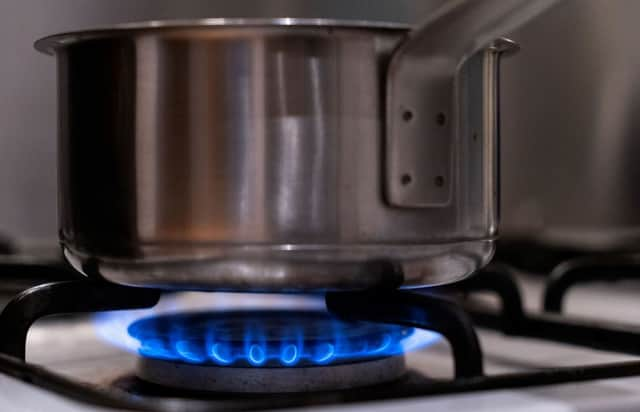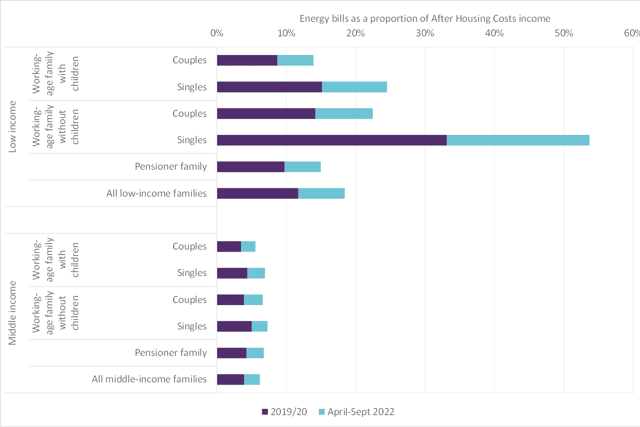Rising energy bills will hit poorest hardest and push more children into poverty, new research shows
This article contains affiliate links. We may earn a small commission on items purchased through this article, but that does not affect our editorial judgement.


Those already struggling will be hit hard by rising energy prices this April, with single adult households expected to see the cost of heating their homes eat up more than half their income, according to a think tank.
A new report by the Joseph Rowntree Foundation (JRF) states that the massive squeeze on household incomes comes after a period of rising child poverty which will have serious long-term impacts.
At a glance: 5 key points
- Low income households with spend on average 18% of their income after housing costs on energy bills after April, with single adult households likely to spend 54%, up more than 20 percentage points since 2019/20, while lone parents will spend around 25%, up 10 percentage points
- Those on middle-incomes will be less severely impacted, although will still see an increase in the proportion of their earnings being spent on energy bills after the rise
- JRF is warning that without additional support, people already in poverty are likely to find a sharp increase in energy bills very difficult to cope with, as just over a third of people in poverty have liquid savings of less than £250 compared with one in six of the overall population
- An analysis of child poverty by the think tank found that around 1.8m children are growing up in deep poverty - meaning their household income is not nearly enough to cover the basics - while around a fifth of children have lived on a low income for at least three of the four years between 2016 and 2019, although this rises to one in three for children in lone-parent families
- An expert from the children’s charity Action for Children said the government has “been in denial” about high and rising child poverty
What’s been said?
Advertisement
Hide AdAdvertisement
Hide AdKatie Schmuecker, Deputy Director of Policy & Partnerships at JRF said: “No childhood should be defined by a daily struggle to afford the basics. But the reality is that many children growing up today won’t have known anything else. The fact that more children are in poverty and sinking deeper into poverty should shame us all.
“Rising energy prices will affect us all, but our analysis shows they have the potential to devastate the budgets of families on the lowest incomes. The Government cannot stand by and allow the rising cost of living to knock people off their feet. The alarm is sounding loud and clear and the case for targeted support to help people on the lowest incomes could not be clearer.
“But this must go hand in hand with urgent action to strengthen our social security system, which was woefully inadequate even before living costs began to rise. Our basic rate of benefits is at its lowest real rate for 30 years and this is causing avoidable hardship. The Government must do the right thing and strengthen this vital public service.”


Director of policy and campaigns at Action for Children, Imran Hussain, said: “Low-income families are enduring a miserable winter of cuts to Universal Credit, soaring energy bills and the prospect of yet more price rises. Families with children are among the hardest hit by this crisis as they typically face bigger bills, have smaller savings and are less able to take on extra work.
Advertisement
Hide AdAdvertisement
Hide Ad“Living in fuel-poor homes is linked to a higher risk of physical and mental health problems in children and can negatively affect their development. Families that struggle to pay their bills can quickly find themselves in problem debt, which can be difficult to escape and is known to have a damaging impact on children’s well-being.
“It’s been clear from our services for many years that more and more families have been falling into deep poverty. The government has been in denial about high and rising child poverty and simply doesn’t have a strategy to tackle it.
“Before this crisis becomes a catastrophe, ministers need to take urgent targeted action for these families. The best way to help low-income families with children is by increasing the child element of Universal Credit and bringing the value of benefits up in line with the rise in inflation.”
A message from the editor:
Thank you for reading. NationalWorld is a new national news brand, produced by a team of journalists, editors, video producers and designers who live and work across the UK. Find out more about who’s who in the team, and our editorial values. We want to start a community among our readers, so please follow us on Facebook, Twitter and Instagram, and keep the conversation going. You can also sign up to our email newsletters and get a curated selection of our best reads to your inbox every day.
Comment Guidelines
National World encourages reader discussion on our stories. User feedback, insights and back-and-forth exchanges add a rich layer of context to reporting. Please review our Community Guidelines before commenting.
